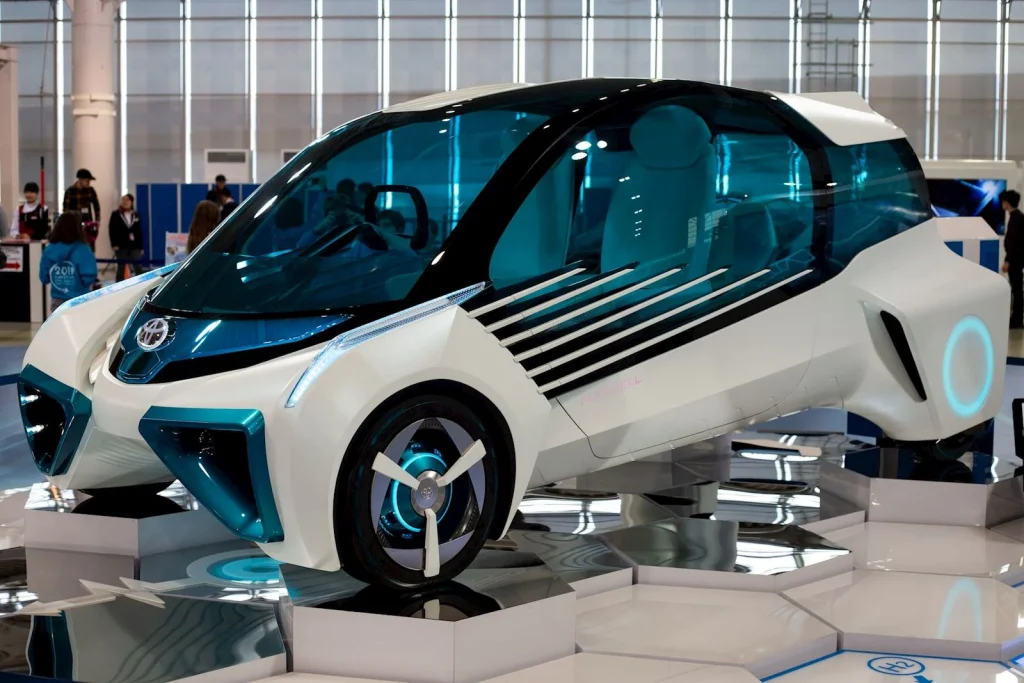
A Green Revolution on Wheels
In recent years, there has been a significant buzz surrounding hydrogen-powered vehicles. These cutting-edge automobiles are not only sleek and efficient but also represent a major step forward in sustainable transportation. With zero-emissions and the potential for long-range driving, hydrogen-powered vehicles are poised to revolutionize the automotive industry. In this blog post, we’ll dive into the world of hydrogen-powered vehicles, exploring their technology, advantages, and the exciting potential they hold for a greener future.

Unleashing the Power of Hydrogen:
- At the heart of hydrogen-powered vehicles lies a remarkable technology: fuel cells. Unlike conventional combustion engines, these vehicles use fuel cells to convert hydrogen gas into electricity, which then powers the vehicle’s motor. The only byproduct of this process is water vapor, making hydrogen-powered vehicles a true champion of clean energy. Imagine driving without the guilt of harmful emissions, knowing you’re contributing to a greener planet.
Zero-Emissions Driving:
One of the most significant advantages of hydrogen-powered vehicles is their zero-emissions nature. As they run on hydrogen gas and produce only water vapor as a byproduct, these vehicles have no direct impact on air quality or contribute to greenhouse gas emissions. This makes them a promising solution to combat climate change and reduce our dependence on fossil fuels.
Endless Range:
Range anxiety, the fear of running out of battery power, has been a concern for electric vehicle owners. However, hydrogen-powered vehicles offer a compelling solution. With their ability to store and carry hydrogen gas, these vehicles can provide a longer driving range compared to many electric cars. The refueling process is also quick, similar to filling up a conventional gasoline vehicle, allowing for convenient long-distance travel.
Infrastructure Advancements:
As the popularity of hydrogen-powered vehicles grows, so does the need for a robust hydrogen infrastructure. While the current hydrogen refueling network is still developing, progress is being made to expand it across different regions. Governments and private enterprises are investing in the establishment of hydrogen stations, making it increasingly accessible to fuel up hydrogen-powered vehicles. With ongoing infrastructure advancements, the potential for widespread adoption of these vehicles becomes even more promising.
Innovations and Collaborations:
Major automakers and technology companies are actively engaged in developing hydrogen-powered vehicles. Companies like Toyota, Hyundai, and Honda have already introduced hydrogen fuel cell cars, showcasing their commitment to the technology. Furthermore, collaborations between automakers and energy companies are fostering the growth of hydrogen infrastructure, ensuring a sustainable ecosystem for these vehicles. It’s an exciting time for innovation and collaboration, paving the way for a greener automotive future.
Overcoming Challenges:
While hydrogen-powered vehicles have tremendous potential, they still face some challenges. One hurdle is the cost of production and infrastructure development. However, as technology advances and economies of scale come into play, the cost is expected to decrease. Another challenge is the availability of hydrogen refueling stations, which can be limited in some areas. However, as mentioned earlier, efforts are underway to expand the infrastructure, making refueling more accessible to drivers.
The Road to a Greener Future:
Hydrogen-powered vehicles represent a significant step toward a greener future. With their zero-emissions, long-range capabilities, and ongoing advancements, these vehicles have the potential to transform the way we drive. As more people adopt hydrogen-powered vehicles, the demand for hydrogen infrastructure will continue to rise, creating a positive feedback loop for a sustainable transportation ecosystem.
Conclusion:
The rise of hydrogen-powered vehicles heralds a new era of clean and sustainable transportation. With their zero-emissions profile, long driving range, and ongoing advancements, these vehicles are shaping the future of the automotive industry. As governments, automakers, and consumers unite in the pursuit of greener mobility, hydrogen
